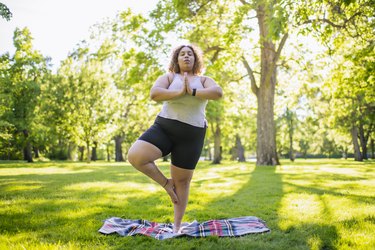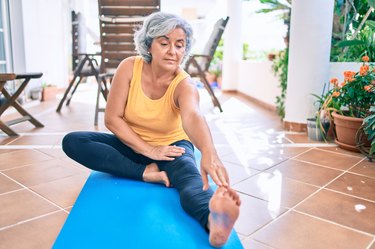
There's a clever trick all savvy cross-country runners play: Run your first time trial a bit slow so you'll see a pretty big improvement by the end of the season. Let's be honest: If you ran, you did it too.
This year, apply the same strategy to your New Year's resolutions. Instead of busting out of the gate with a lofty goal, start with small, bite-sized habits that can make you feel a whole lot better.
Video of the Day
Video of the Day
These six resolutions are easy to accomplish, low-commitment and you can do them right in your own home.
1. Stand Up Every Hour
If you find yourself spending a lot of time sitting, set an alarm on your phone to get up from your desk, says April Whitney, certified strength and conditioning specialist. (Your Fitbit or Apple Watch might already be reminding you to do this!)
"The most difficult part here is simply remembering — we often get wrapped up in emails and work and hours pass by without standing up," Whitney says. "[But] getting up and moving every hour improves circulation, metabolism and energy levels, and combats lethargy."
Starting small can help make this habit stick. At first, stand every hour on Mondays, Wednesdays and Fridays. Then, month by month (or week by week if you're up for the challenge), add an extra day to your standing schedule.
2. Cook One Meal Each Day
Considering there are countless food delivery platforms promising cheaper and cheaper fees, the temptation for takeout is real. But cooking even just one meal a day is a great habit to build, according to Bonnie Taub-Dix, RD, creator of BetterThanDieting.com and author of Read It Before You Eat It: Taking You from Label to Table.
Cooking is not only a healthier alternative to takeout, but it'll save money, too. Plus, honing a new skill is never a bad thing. And preparing a meal doesn't have to be an elaborate, time-consuming process, Taub-Dix says.
A great place to start is incorporating leftovers from an ordered meal into the one you're cooking, Taub-Dix says. Adding last night's barbecue chicken or teriyaki salmon to some sautéed vegetables and pasta will save food from the trash and give your veggies a takeout feel.
3. Cut Your Screen Time by 10 Minutes a Day
Completely cutting out technology or social media is pretty unrealistic, and frankly, not necessary. But trimming down your non-work-related scrolling is totally doable.
"We don't really need to be reminded, but too much screen time can lead to poor eyesight, a disruption in your circadian rhythm (due to the blue light), neck and back pain or headache," Whitney says. "Making a resolution to reduce it can create time for other activities and opportunities that may not only be healthier but also more fulfilling in the long run, as hard as it might be at first."
The tricky part? Figuring out how much daily screen time you can realistically cut. Set a sustainable limit by first checking your total screen time on your phone (most have this technology built in). Then, reduce that total by even just 10 minutes, Whitney says. Each month, you can tack on an extra 10.
With an iPhone, you can use the "Downtime" and "App Limits" features to help stay aware of your total screen time — you can even set up an alert when you're approaching your allotment for the day. If you have another phone, you can download a screen time app to send you notifications.
"Being aware on a daily basis is the key to sticking to this resolution," Whitney says.
4. Stretch Every Day
Many people tend to skip out on flexibility and mobility exercises. This year, pick one mobility problem area — common trouble spots include the hips, shoulders, knees, ankles or back — to work on each week.
For CrossFit trainer Maillard Howell, owner of Dean CrossFit and creator of The Beta Way, that means sitting at the bottom of a squat. To improve his lower-body mobility, Howell holds the position for 10-second increments, working his way up week by week.
"This habit is super timely right now with the large number of people working from home, sitting for hours on end at a desk," Howell says. "Hip health is important to quality of life as we age."
For you, this resolution may involve holding an upward dog pose to improve back mobility or breathing through a wrist stretch. Once you feel more comfortable in these positions, you can try another or move to a different part of your body.
Start by doing your mobility move or stretch for one minute each day. Over time, build up to performing your exercises for a minute at the top of each hour, Howell says.
5. Have One Less Glass of Wine
After a long day, a glass of wine can help you unwind and clear your head. One glass probably won't do much harm, but alcohol can hurt your sleep and recovery, which is the last thing you want after a busy, stressful day, Whitney says.
Being mindful of how many days each week you drink can be a healthy resolution, Whitney says. Start by meeting yourself where you are: If you're drinking five days a week, maybe you start by cutting back to four. Or, if you tend to have two drinks twice a week, cut one of those days by one glass.
Then, once you establish a realistic starting point, you can cut back more as the months go by.
Finding an alternative activity can be helpful. Try replacing your nightly glass of wine with a different act of self-care that provides a similar release, Whitney suggests. Rather than going cold turkey, swap one of your boozy nights with a soothing activity like a warm bath or video chat with a friend. Or, try a delicious mocktail.
6. Drink One More Glass of Water
On days that feel never-ending, hydration drops low on the priority list. But drinking more water is an easy habit to adopt and will make you feel a whole lot better, Taub-Dix says.
To increase your daily water intake, set yourself up for success. Ditch single-use plastic and buy a large reusable water bottle to carry around the house. Choose a bottle you'll actually use: If you don't like heavy bottles, go for lightweight plastic. If you prefer your H2O cold, opt for an insulated variety.
If the thought of guzzling plain water all day isn't appealing, add some flavor. Toss a cucumber or lemon slice into your water to add some refreshment. Or, drink herbal tea out of a massive mug, Taub-Dix says.
The foods you eat can increase your daily hydration, too, she adds. Water-rich foods like watermelon and soup will increase your daily intake, while giving you the opportunity to try new ingredients.
Is this an emergency? If you are experiencing serious medical symptoms, please see the National Library of Medicine’s list of signs you need emergency medical attention or call 911.






